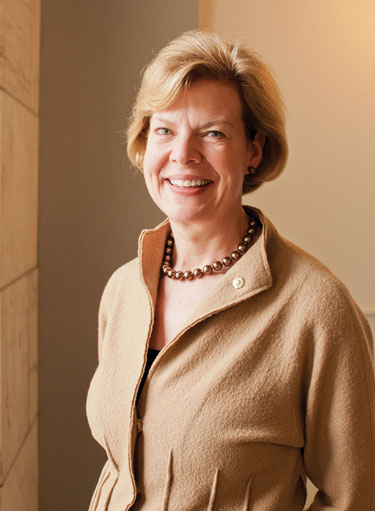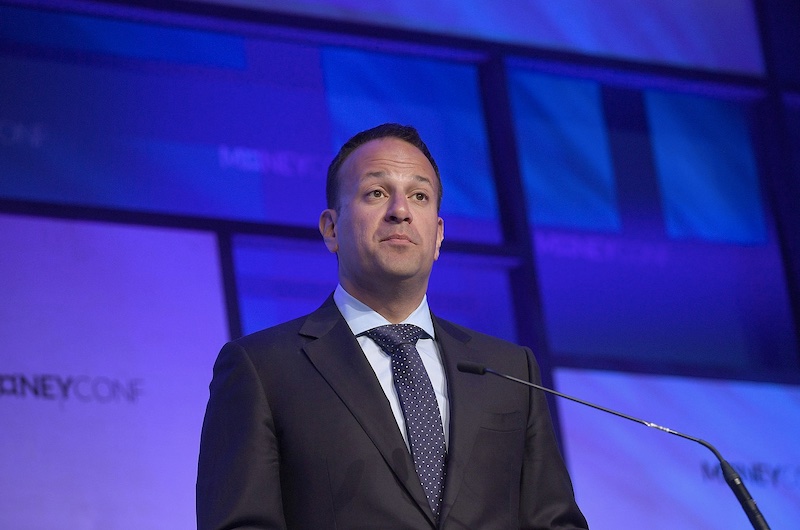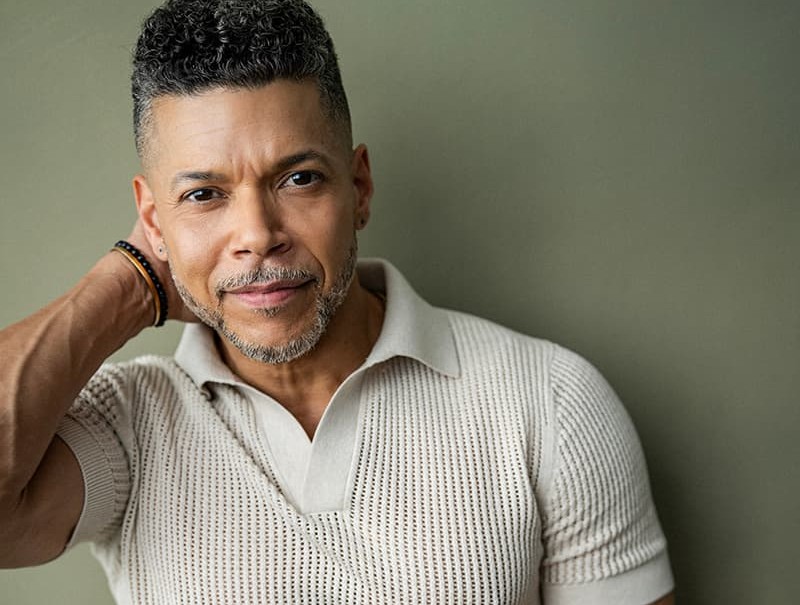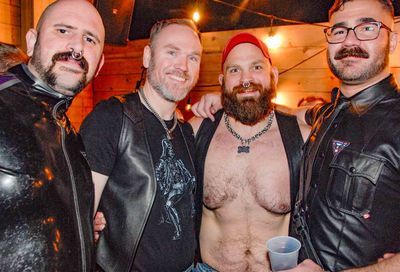Senate Star
As America's first gay senator, Tammy Baldwin lights the way

Tammy Baldwin
(Photo by Todd Franson)
MW: There have been so many moderate Democrats in the Senate who are just putting it out there and saying this is where they are on this issue.
BALDWIN: It’s quite remarkable.
MW: What do you think it says that this is something elected officials can now go out there and say this is something they now believe in?
BALDWIN: It says a lot of things, among them that sometimes when you’re a leader and in the public light, you do things and take positions because they’re right, not because they’re going to win an election or win you political favor. And I think this is such a moment and I’m really proud of them.
MW: Some of the senators who have come out for marriage equality in the past week or so have faced criticism that they’re being opportunistic. Some criticized Sen. Portman because they said that he only cares about this issue now because it directly affects his family. What do you make of those criticisms?
BALDWIN: I believe that gay family members, gay neighbors, coworkers, distant cousins, fellow congregants at church — I think Harvey Milk was right: Come out, come out wherever you are, and that’s how you’re going to change the world.
In many ways, I think Sen. Portman’s journey is very similar to how President Obama articulated his journey on the issue of marriage equality and how most Americans have dealt with this issue. So I think it’s very reflective and I hope more people get the chance to take that journey.
MW: For Wisconsin, is marriage equality something that will get there one day?
BALDWIN: One day. I don’t think it’ll be tomorrow. Wisconsin is such an interesting state with regard to civil rights generally, and LGBT rights in particular. You may or may not know that Wisconsin was the first state to pass a nondiscrimination statute on the basis of sexual orientation, banning discrimination in employment, public accommodations and education in – guess the year.
MW: 1980-something?
BALDWIN: ’82. Signed into law by a Republican governor. It took seven years for the next state to pass one, and that was Massachusetts in 1989.
So, you know, wow. Remarkable. Wisconsin. And there wasn’t really at the time any sort of statewide activist group. It was a remarkable chain of events that led to that. And then in 2006 it was one of the states to pass a referendum on a constitutional amendment defining marriage as between a man and a woman. I’ve seen Wisconsin citizens grapple with these things over the years. I don’t think it’s easy to typecast our state.
In the year following the constitutional amendment, the state passed a domestic-partnership registry with a very limited set of rights and responsibilities associated with it. But our constitutional amendment was one of the ones that said marriage is between a man and a woman and the state can’t pass any substantially similar laws affording rights to same-sex couples. And so we just had reviews of the domestic-partnership registry and basically they’ve come to the conclusion that it bears no substantial similarity to the institution of marriage, so it’s fine. So we’re a state with a domestic-partnership registry and a constitutional amendment.
I think Wisconsin will be a state where we see progress in future years, but it will be slow. And the undertaking of repealing a constitutional amendment is a big undertaking. Every state has a different process for amending their constitution. In our state it requires two successive legislatures to act on the same identical language, then it goes on the ballot and it’s put to a popular vote, which requires a majority. But two successive legislatures, that means you have to have the legislative leadership. Today we don’t. So it’s not happening tomorrow.
MW: You’ve been involved in some other key issues. You’re a co-sponsor of a bill that recently passed committee on organ donations for people who are HIV-positive. With a slew of LGBT issues out there, do you think marriage has gotten too much focus?
BALDWIN: It’s so interesting. I think that to the degree that there’s a movement it’s for full equality in every dimension, and yet one focuses strongly where there’s opportunities. It wasn’t so long ago that the biggest focus around was repeal of ”Don’t Ask, Don’t Tell,” because there was promise and opportunity that that could happen, that it could happen legislatively, that the folks who would be charged with implementing that were committed to doing so, because certainly you can pass something and have it fail in the implementation.
So there was an array of things, and I think you’re seeing that moment in the fight for marriage equality. At the same time, I wouldn’t be at all surprised if the legislative focus at the national level quickly moves to the Employment Non-Discrimination Act and [nondiscrimination] executive order that we hope the president will undertake on federal contractors.
And when you look at the states, what opportunities exist there, for different states, different localities that answer is different. I think it’s a convergence of obvious areas in which we lack full equality and full civil rights, and the opportunity to actually make progress on them.
I would point to another one that I suspect will also capture a lot of our attention and effort, and that is safer schools and communities for LGBT youth, whether that’s student nondiscrimination statements or policies or anti-bullying and harassment programs. Even in a Congress where one house is controlled by tea party-animated folks, something like that could move.
MW: You mentioned ENDA. You sit on the Senate Health, Education, Labor & Pensions Committee, which oversees ENDA. What’s your read of the prospects for that bill?
BALDWIN: I’m heartened by, first of all, Chairman [Tom] Harkin’s (D-Iowa) saying he intends to have a hearing, he intends to have a markup of the bill and report it out of committee. That’s very exciting. I know there’s still work to be done before that process starts in terms of getting the bill into final form before introduction, but I think that’s great. To be on the committee that works on it is very exciting.
In the House I was on the Judiciary Committee for many years, not the whole time I was there. So, I got to be on the committee as we were going through the process of marking up the Matthew Shepard and James Byrd Jr. Hate Crimes [Prevention Act], it was kind of like being in the oral arguments this morning. I felt like, ”This is history unfolding right in this room,” and it was really fascinating.
MW: When there is a person in the room who is gay, who’s talking about something that affects other gay people, does that change the game?
BALDWIN: There’s no question. You know, I always said during the campaign, when you’re not in the room the conversation’s about you and when you’re in the room the conversation is with you.
Some of what happens is much more subtle, as where my new colleagues are getting to know me and they feel comfortable enough asking questions about my own life experiences — Have I faced discrimination? Have I faced this that or the other things? — that they have their ”Aha” moments. But it doesn’t necessarily happen immediately around the debate on [ENDA]. It might happen in other ways, which I think is great. I certainly think it makes a difference.
You probably remember my history in the House as one of the co-chairs of the LGBT Equality Caucus. We took on the responsibility of counting the votes as things were maybe headed to the floor, so we could tell the leadership if we had the votes. Unlike most whipping operations, it was bipartisan. We were talking to any Republican we thought we could get on board.
For some of them the thing that’s moving to them is those stories from their constituents. It matters when it comes from their constituents. But, interestingly on ENDA, a lot of the persuasive arguments for some – especially folks who are more fiscal conservatives – is hearing from their business community about how, ”We’ve had a [nondiscrimination] policy for 15 years and we have it because we want to be able to attract the best talent for our organization. We want to be globally competitive and we want a happy and productive workforce,” and whatever it is. And they’re kind of going, ”Aha, well I guess we should want that for the federal government and we should want that for America.” It really varies what the persuasion point is for various officeholders and policymakers.
Support Metro Weekly’s Journalism
These are challenging times for news organizations. And yet it’s crucial we stay active and provide vital resources and information to both our local readers and the world. So won’t you please take a moment and consider supporting Metro Weekly with a membership? For as little as $5 a month, you can help ensure Metro Weekly magazine and MetroWeekly.com remain free, viable resources as we provide the best, most diverse, culturally-resonant LGBTQ coverage in both the D.C. region and around the world. Memberships come with exclusive perks and discounts, your own personal digital delivery of each week’s magazine (and an archive), access to our Member's Lounge when it launches this fall, and exclusive members-only items like Metro Weekly Membership Mugs and Tote Bags! Check out all our membership levels here and please join us today!


























